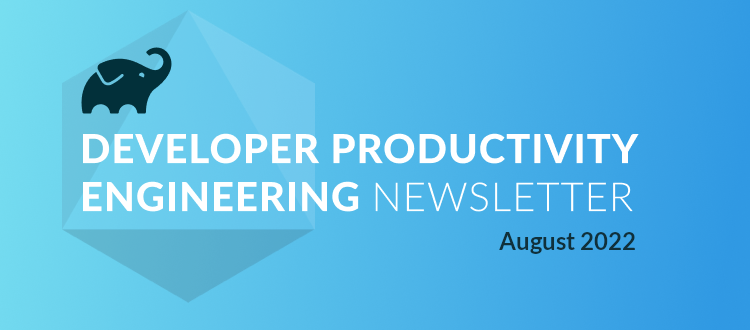
FEATURED upcoming EVENT
The next DevProdEng Showdown (“Scaling Developer
Productivity at Global-Banking Scale”) will take
place on August 24th at 10:00 AM - 11:00 AM
Pacific time. It will feature productivity
engineering, developer tooling, and developer
experience experts—from Goldman Sachs, JP Morgan
Chase, Morgan Stanley, and US Bank—who have been
working on the challenges of shipping software at
scale at large, heavily regulated financial
institutions.
If you’re interested in learning about scaling
your DevProd strategy and experience, learn from
the banking icons that do everything at a massive,
global scale. Join us and get expert opinions and
answers to thought-provoking questions in an
entertaining, rapid-fire, game-show-like format.
As always, you vote on the best answers and
determine the winner.

BEST PRACTICES
Square Speeds Up Local Builds with a Remote Build
Cache
 A recent blog explains how the team
behind Cash App (Square’s mobile payment
service), leverages one of the most
powerful features of Gradle Enterprise,
its remote build cache. Build
caching allows teams to share the benefits
of caching, even for local builds. If your
teammate has recently built some code and
that code hasn’t changed, there’s no
reason to rebuild it. A recent blog explains how the team
behind Cash App (Square’s mobile payment
service), leverages one of the most
powerful features of Gradle Enterprise,
its remote build cache. Build
caching allows teams to share the benefits
of caching, even for local builds. If your
teammate has recently built some code and
that code hasn’t changed, there’s no
reason to rebuild it.
Read on to see how the Cash App team set
up their remote build cache to make
everyone more efficient by significantly
improving build and test feedback cycle
times. Not only was the Cash App team able
to get significant savings from the remote
build cache, but they also found
geographic areas where the cache wasn’t
performing as well, and then used hard
data to justify a second cache node that
brought higher productivity to the whole
organization.

Expert TakeS
 In our most recent
DevProdEng Lowdown, we talked to
Gautam Korlam and Ty Smith, who work on the
Developer Productivity and Experience team at
Uber. Uber has about 200 platform engineers
dedicated to improving developer productivity that
support about 4,000 developers. In our most recent
DevProdEng Lowdown, we talked to
Gautam Korlam and Ty Smith, who work on the
Developer Productivity and Experience team at
Uber. Uber has about 200 platform engineers
dedicated to improving developer productivity that
support about 4,000 developers.
To further expand on the scale of their
development environment, Gautam and Ty
characterized the magnitude of developer activity
at Uber as follows:
-
Thousands of microservices
-
Hundreds of thousands of deployments
per month
-
Millions of config changes per
month
-
Tens of mobile apps
-
Seven programming languages
-
Tens of thousands of commits per
month
-
Hundreds of millions of monorepo
LOC
-
Trillions of mobile analytic events per
month
-
Billions of user sessions per
month
So, at this massive scale, what are the key
developer productivity metrics that matter to
Uber? Gautam and Ty shared their shortlist, which
includes:
-
Build Time
-
Failure Rate
-
IDE Performance
-
App Performance
-
CI/CD Time
-
Developer NPS
For a more in-depth explanation of these metrics
and why they are important to Uber, and to hear
the broader set of questions and answers, check
out the Lowdown webcast recording.

IDEAS & INSIGHTS
Register today for the Developer Productivity
Engineering Summit 2022: Next Practices for
Improving the Developer Experience. It will take
place on November 2-3 in San Francisco. This
two-day, two-track event will bring together the
brightest minds in the world of developer
productivity. This will be your chance to learn
from real-world use cases on how to leverage DPE
next practices and tools to achieve digital
transformation and pursue a
developer-experience-driven competitive advantage.
The event will feature speakers from Airbnb,
DoorDash, Gradle, LinkedIn, Microsoft, Netflix,
Slack, and Uber.
In addition to the super early bird price, use
promo code “dpe-100” to get an additional $100
off.
|
